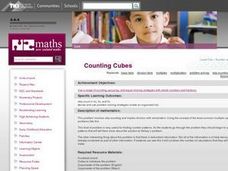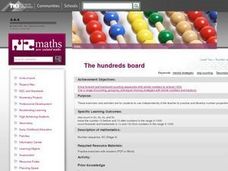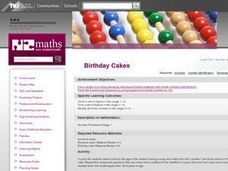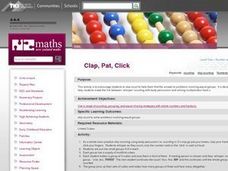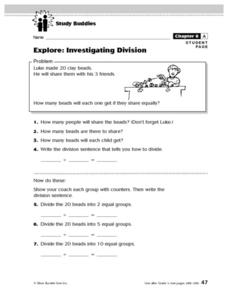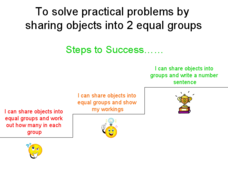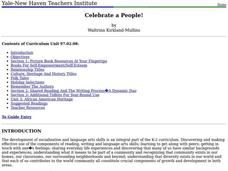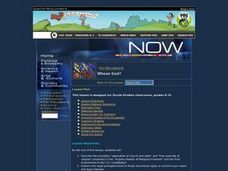Curated OER
Money for starters
Pupils compare the values of coins and paper money. They read prices, read and write any 2-digit number. They model and explain addition calculations with a sum of up to 20.
Curated OER
Make a 100
Second graders develop an understanding of 100 and the quantity for which it stands and examine the relationship between 100 and 10 by estimating the number of jelly beans in a jar.
Curated OER
The Three Cold Kittens
Students solve a math word problem involving repeated addition. They identify the important information in the problem, brainstorm ways to solve the problem, and solve the problem and discuss the solution as a class.
Curated OER
Well,Well!
Second graders explore and solve a math word problem that involves a series of single digit additions and subtractions. They brainstorm ways to solve the problem, independently solve the problem using drawings, and discuss the various...
Curated OER
Counting Cubes
Students count backwards in 2s from 30 then try other skip patterns such as 1,3,5, etc. and invent their own counting patterns. They are introduced to the problem using a pile of cubes and count by 2s and have a remainder.
Curated OER
The Hundreds Board
Students explore the concept of multiples and use a hundreds board to add numbers and then graph them. Afterward, they use the sieve of Eratosthenes to identify prime numbers and discover how numbers change when you add or subtract by ten.
Curated OER
Birthday Cakes
Young scholars use basic multiplication and division facts to find simple fractions of an amount. Independently they complete a worksheet of birthday cake problems, solving the fraction problems by drawing a picture to illustrate each...
Curated OER
Clap, Pat, Click
First graders practice the art of skip counting to help them find the answer to problems involving equal groups. They are encouraged to make the link between "whisper" counting with body percussion and solving multiplication facts.
Curated OER
The Electric Hookup
Middle schoolers determine the wattage of appliances found in the home. They identify ways to conserve energy and calculate the number of kilowatt-hours that appliances use. They also discover the costs per kilowatt-hour for the appliances.
Curated OER
Explore: Investigating Division
In this exploring and investigating division worksheet, learners, working with a partner, study and answer seven clues to exploring and investigating division equations.
Pennsylvania Department of Education
Shapes Around Us
Learners use manipulatives to study shapes. They sort shapes and use correct geometric terminology to describe them. Students find real-life examples of 2 and 3 dimensional shapes, and classify figures in their classroom according to...
Curated OER
Problem Solving: Division
A cute zoo theme sets the tone for a problem-solving activity which primes early learners for division. They separate zoo animals into equal groups and then write an equation that expresses the action.
Curated OER
Just-Us and Kindness: On Our Terms
Middle schoolers consider their citizenship responsibilities in the world. In this philanthropy lesson, students define civic virtues as they consider how to be fair, just, and tolerant to promote human rights. Middle schoolers complete...
Curated OER
Freethought Day Lessons
Freethought Day provides a way for students to discuss the current justice system.
Curated OER
Covalent Compounds
For this compounds worksheet, high schoolers practice writing ion notation and making ionic compounds. Students make covalent bonds. This worksheet has 10 fill in the blank and 18 problems to solve.
Curated OER
Fractions and Division
In this fractions and division worksheet, 4th graders write 10 answers as a fraction, mixed number or as a whole number. Students study a table to figure out the amount of each material used to made six identical centerpieces.
Curated OER
Naming and Covalent Compounds
In this naming and covalent compounds worksheet, students answer 6 questions about ion notation, they make 6 ionic compounds, they make 6 covalent compounds and they name 10 compounds which are ionic, covalent or polyatomic.
Pennsylvania Department of Education
Freckle Face
Students collect and record data. In this early data analysis lesson, students gather data about their partners face. As a class, the students use tally marks and pictographs to record the data and answer question about the information...
Curated OER
Celebrate A People!
Learners explore African-American students literature as an integral building block in empowering all learners to a better awareness when reading and writing. They use as a productive Social Studies tool for overall understanding of the...
Curated OER
Diplomatic Field of Dreams
Students explore past U.S.-Cuban relations, by researching key events in the past century and creating a class timeline, in order to evaluate restrictions in policy on Cuba and the potential for exhibition baseball games.
Curated OER
Whose God?
Students investigate religious freedom in the U.S. They watch and discuss a Bill Moyers NOW video, take a Freedom of Religion quiz, write an essay, and participate in a mock trial and debate.
Curated OER
Math Investigations
Students brainstorm how math is used in daily life. They develop a class list of different topic areas in which math is used and
work in small groups to think of specific examples of how math is an important part of their lives.
Curated OER
The Magic of Static
Students investigate static electricity. In this physics lesson, students participate in an experiment with balloons to demonstrate how static electricity works.
Curated OER
Types of Government
In this types of government learning exercise, students write the advantages and disadvantages and countries that follow these governments. Students do this for 7 different types of government.






